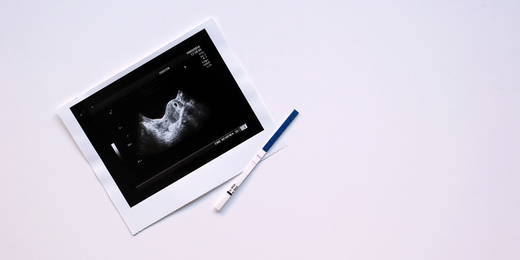Key Takeaways
- Find out how your baby begins the amazing journey from a single cell to a tiny human being in the first trimester, as the heart, brain and organs form.
- Week by week, we take you through exciting developmental steps, from implantation and the first heartbeat to the formation of sexual organs and tiny fingerprints.
- Discover how your body adapts through hormonal changes and creates a perfect environment for your baby - a fascinating time full of little miracles and important milestones.
Have you just found out you're pregnant and want to know what to expect in the coming weeks? The first trimester is a particularly exciting time, when your baby develops from a single fertilized egg into a small human being. These first twelve weeks are crucial for your baby's basic development.
During this time, your baby goes through various fascinating developmental stages – from fertilization to implantation to organ development. You will learn how the heart, brain and other vital organs form while your body adjusts to the pregnancy through hormonal changes. In this article, we will guide you week by week through this important phase and explain all the important developmental steps of your growing baby.
The first four weeks: From fertilization to implantation
The most fundamental developments take place in the first four weeks of your pregnancy. This phase is the beginning of an amazing journey that starts with a microscopic moment.
The moment of fertilization
Fertilization is much more than just a simple meeting of egg and sperm. Your egg actively releases chemical messengers that guide the sperm. After fertilization, the zygote is created – your baby in its very first stage of development.
The journey through the fallopian tube
The fertilized egg begins a fascinating journey through the fallopian tube. Scientists have observed that this transport is more complex than previously thought. The egg:
- Moves in circular pathsIs controlled by special “gates” in the fallopian tube
- Is transported by a combination of cilia and muscle contractions
During this journey, the fertilized egg divides several times. After about four days, it already consists of 32 to 64 cells. At this stage, it is called a blastocyst.
Implantation in the uterus
Implantation takes place between the fifth and tenth day after fertilization. By this time, your fertilized egg has already developed into a structure of about 200 cells.
One fascinating aspect is the “embryo-maternal dialog” - a kind of communication between the embryo and your uterine lining via hormones and other messenger substances. This communication is crucial for successful implantation.
Implantation itself is a precisely orchestrated process. Only about one in four fertilized eggs successfully implants. Once implantation has occurred, the placenta begins to develop, which will supply your baby with nutrients throughout the entire pregnancy.
A protective amniotic sac with amniotic fluid also forms in the uterus, which will surround your baby throughout the entire pregnancy. In addition, the yolk sac develops, which supplies the embryo with important nutrients during the first few weeks.
Weeks 5-8: The development of organs begins
Weeks 5 to 8 of your pregnancy mark a fascinating phase of organ development. During this time, the basic structures that your baby needs to live are created.
Formation of the neural tube
A crucial developmental step takes place between days 19 and 28 of your pregnancy: the formation of the neural tube. This process begins with the formation of the neural plate, which later develops into the brain and spinal cord. The closure of the neural tube occurs in stages:
- The process starts at the neck area
- The front part (neuroporus rostralis) closes on day 29
- The rear part (Neuroporus caudalis) follows on the 30th day
Development of the heart and blood vessels
A special milestone is the first heartbeat of your baby, which already begins on the 22nd day. From the 6th week, you can even see this heartbeat on ultrasound. The cardiovascular system develops as the first functioning organ system.
The fetal circulation is quite different from that of a newborn child:
- Your baby gets oxygen through the umbilical cord
- The blood flows through special fetal vascular connections
- The lungs are not yet actively involved in the oxygen supply
Development of the internal organs
The intensive phase of organ development begins in the 7th and 8th week of pregnancy. At this point, your baby is about 15 millimeters tall. The most important developments are:
- Digestive system: the liver and stomach begin to form
- Excretory system: the kidneys develop and begin their work
- Sensory organs: the mouth, nose and eyes develop
It is particularly interesting that the liver and kidneys can already begin their detoxification function in the 7th-8th week of pregnancy. The pancreas also develops early, around the 3rd week of pregnancy.
In the 8th week of pregnancy, the skull bone is not yet present, as the brain initially needs room to grow. At this point, brain waves can already be measured, and you can even make out your baby's tiny fingers, which develop faster than the feet.
The amniotic sac is now fully formed, enveloping your baby in protective amniotic fluid. This clear fluid contains important nutrients such as protein, sugar and mineral salts. It creates a perfect environment for your baby, protecting it from knocks and cushioning it from outside noise.
Weeks 9-12: From embryo to fetus
By week 9, your baby has reached an important milestone – he is no longer considered an embryo, but a fetus. This change marks the beginning of a period of rapid development.
Development of limbs and facial features
During this exciting phase, your baby is taking on more and more human features. Development is progressing rapidly:
- The eyes and ears are moving into their final position
- Tiny eyelashes begin to grow
- The eyelids stick together and remain closed until the third trimester
- The first milk teeth are already in the jaw
The skull bones now form to protect your baby. These are connected by the fontanelles – gaps covered by connective tissue – so that the head can later fit through the birth canal.
Development of the sex organs
Your baby's sex was determined at the time of fertilization, but the visible development of the sexual organs is only just beginning. In the 9th week of pregnancy, the Y chromosome causes the testes to develop in boys. In girls (XX chromosome), a female gonad develops.
It is interesting to note that primordial germ cells form in the wall of the yolk sac in girls even in the early development phase. The breast tissue develops at the same time, and in the 7th week the ovaries develop, which release the hormone estradiol.
First movements of the baby
Your baby is now very active, even if you can't feel it yet. The development of the ability to move is impressive:
- Nerves and muscles are already working together
- The stomach produces the first digestive juices
- The kidneys start excreting urine
- Fingers not only have nail beds, but also individual fingerprints
The brain develops particularly rapidly in this phase - an average of 250,000 nerve cells are created per minute. For this intensive development, your baby needs an adequate supply of nutrients and oxygen, which it receives through the placenta.
By the end of the 12th week, your baby has already reached a considerable size of six to seven centimeters and weighs about 20 grams. All vital organs are now in place and the most dangerous time of pregnancy is over – the risk of miscarriage is now significantly reduced.
Physical changes in the mother during the first trimester
While your baby is undergoing this amazing development, your body is also adapting to the new situation. The first trimester brings significant changes, controlled by your hormonal system.
Hormonal changes
Your body undergoes an impressive hormonal transformation. Just a few days after fertilization, the production of the pregnancy hormone hCG begins, and its concentration increases continuously until the end of the first trimester. This hormone is not only responsible for the positive pregnancy test, but also supports the development of your baby.
The most important hormones during your pregnancy are:
- Progesterone: Rises sharply in the first few weeks and prepares the lining of the uterus.
- Estrogen: Ensures the elasticity of the connective tissue and controls the growth of the uterus.
- Prolactin: Prepares your breasts for later breastfeeding.
- Thyroid hormones: Are increasingly produced and are important for the development of the child's nervous system.
Typical pregnancy complaints
The first signs of pregnancy may appear from the sixth week of pregnancy. These changes are completely normal and a sign that your body is adjusting to the pregnancy:
Your metabolism is changing fundamentally:
- Your basal metabolic rate and oxygen consumption are increasing
- The fluid retention in the cells is increasing
- Your immune system is adapting to protect your baby
Many women* find the first trimester particularly exhausting. The most common complaints include:
- Nausea, especially in the morning
- Tiredness and exhaustion
- Circulation problems
- Frequent urge to urinate
- Drawing in the abdomen
The pulling sensation in the abdomen is caused by the stretching of the ligaments that hold your uterus in the pelvis. This adjustment is necessary so that your uterus can grow with the baby.
Changes in the breasts and uterus
Your breasts will undergo significant changes during the first trimester. The glandular tissue will begin to grow, causing the breasts to increase in volume. This can lead to a feeling of tension. The nipples may darken and become more sensitive.
The uterus undergoes an especially impressive development:
- Its weight increases from about 50 grams to up to 1,500 grams at the end of pregnancy
- Blood flow increases from 50 ml/min to about 800 ml/min
- The muscle layer grows twentyfold
Your entire cardiovascular system adapts:
- Blood volume increases by about 1.5 liters
- The pulse is slightly increased
- Blood pressure may be slightly lower
Your skin also reacts to hormonal changes. The pregnancy hormone progesterone increases the metabolic rate and affects sebum production. This can cause your skin to:
- appear cleaner and rosier
- react more sensitively to UV light
- show pigment changes
An important note: An additional calorie intake of 300 Kcal per day is recommended. The total weight gain should be around 12.5 kg for women of normal weight*, with only one to three kilos being gained in the first 20 weeks.
Conclusion
The first twelve weeks of your pregnancy are a fascinating journey, during which your baby develops from a single cell into a small human being with all the vital organs. This fundamental developmental phase includes remarkable milestones – from the first heartbeat at week 6 to the complete formation of the sex organs and individual fingerprints at the end of the first trimester. Your baby undergoes an amazing transformation and already reaches a size of about seven centimeters.
During this time, your body is adapting to the new situation with impressive precision. The hormonal changes and physical adjustments you are undergoing create the perfect environment for your growing baby. Although the pregnancy symptoms can sometimes be challenging, they show that your body is doing exactly what it is supposed to. By the end of the first trimester, you have already successfully mastered the most sensitive phase of pregnancy, and your baby is well equipped for further development.
References & Literature
- Abascal, Gudrun; Forsell, Linda; Hamberger, Lars; Nilsson, Lennart: The Birth of a Child. 11th edition. Mosaik. Munich. 2018.
- Borgwardt, Dirk, MD: My Pregnancy Companion. Trias. Stuttgart. 2008.
- Frank H. Netter. Gynecology, Thieme (2006)
- Kaufmann, Costa, Scharl. Gynecology, Springer (2006)
- Kirschbaum, Münstedt. Checklist, Gynecology and Obstetrics, Thieme
- Patricia G. Oppelt/ Helmuth-Günther Dörr (eds.), Pediatric and Adolescent Gynecology, Thieme

